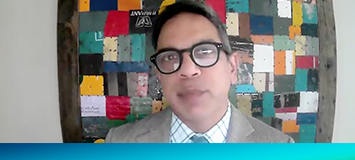Diversity, equity, and inclusion at the AAN
Member engagement
The need for equity and inclusiveness in health care has never been greater. The 好色先生 is firmly committed to embracing the diversity, equity, and inclusion of our members, staff, organization, profession, and, ultimately, the patient communities we serve.
The AAN's vision is to be indispensable to our members, and we continue to embrace our values: Community; Leadership; Well-being; Diversity, Equity, and Inclusion.

AAN DEI in Action
Learn about the Academy's DEI initiatives.

AAN Anti-racism 好色先生 Program
Learn more about the Academy's new Anti-racism 好色先生 Program.

AAN DEI Resources
Discover a wide array of DEI programs and resources available from the AAN.

AAN Policies and Statements
View AAN Policies and Statements.
AAN DEI Policy
The AAN Board of Directors approved a guiding policy on Diversity, Equity & Inclusion.
Health Care Equity Program
The application period for the 2025-2026 Health Care Equity Program is closed. Click the link below to learn more.
Congratulations to the following for joining us for our fifth year of the Health Care Equity Program:
- Omar Al-Janabi, MD, PhD, MSc
- Project: Derived from my experience as a vascular neurologist at Baptist Health in Lexington, KY, I propose initiatives aimed at reducing health care disparities. By leveraging tele-neurology and community outreach, we can enhance access to specialized care for underserved populations, ensuring equitable health outcomes in our region.
- Miya Asato, MD, FAAN
- Project: My project is aimed to identify systemic and other barriers to increase care access for patients with intellectual and developmental disabilities (IDD) in adult neurology care settings. Through activities and discussions with different stakeholders, I will identify key knowledge gaps that impede adult neurology practitioners. Informed by these gaps education, and advocacy-focused resources and approaches will be developed to increase neurologists’ comfort level and competency in providing care to those with IDD.
- Fazila Aseem, MD, MPH
- Project: Patients with acute brain injuries (ABI), such as high-burden strokes, traumatic brain injuries, prolonged seizures, spinal cord injuries, and neurodegenerative diseases, often transition from acute care to Long-Term Acute Care Hospitals (LTACHs) due to the intensive and prolonged nature of their complex care needs. This group represents some of the most vulnerable and least-studied patients in neurocritical care as they are frequently excluded from clinical trials and do not have access to timely follow-up in specialized outpatient neurological clinics. The fragmented care and varying degrees of access to rehabilitation and follow-up resources is often influenced by socioeconomic factors and other social determinants of health. As a neurointensivist and agent of public health, the aim of my project is to develop equity-focused care models to improve the follow-up care and improve neurological recovery for critically ill patients with ABIs and socioeconomic disadvantages in LTACHs.
- Sana Aslam, DO
- Project: Investigating disparities in access to subspecialty care for advanced therapies in Parkinson's disease.
- Nan Cheng, MD
- Project: I propose developing a framework to improve the inclusion of Asian Americans and other underrepresented minorities in neurology clinical trials, with a focus on headache research. This project will involve identifying barriers to participation, creating institution-specific strategies to enhance recruitment, and developing best practices for more equitable trial design. The goal is to produce a scalable model that can be implemented across institutions to increase representation and improve health outcomes for historically excluded populations.
- Shannon DiCarlo, MD, FAAN
- Project: Bringing Rapid Access in Neurology (BRAIN) Community Neurology Expanded Access Initiative: The goal is to improve neurology scheduling workflow in order to get patients seen at the right clinic at the right time by the right provider. Planned interventions include dedicated schedule reviews, prescreening patients via e-consultations, and an urgent care neurology clinic in an under-resourced location which will all provide equitable access to care in a timely manner.
- Qihua Fan, MD
- Project: This is a quality improvement initiative to enhance care for hereditary amyloidosis patients by implementing a survey to gather patient suggestions for improving their care experience. The survey will focus on identifying priorities such as improving communication, providing better education about Medicare options, and integrating multi-specialty care into routine visits. Insights from patient feedback will drive an iterative process to refine and optimize care delivery.
- Alexander Jonokuchi, MD
- Project: New York City is remarkably socioeconomically diverse and disparities in health literacy and other social determinants of health play a major role in the holistic treatment of neurological disease. Combining my passions for fitness, health behavior promotion in children, and mitigating neurodisparities, I hope to explore the role of physical activity in moderating the detrimental effects of neighborhood and social vulnerability index on disease severity and outcomes in pediatric neurology, in multiple sclerosis, and beyond. My project goal is to create a short, targeted intervention to allow providers to accurately measure current behaviors, identify health literacy gaps, and change attitudes and beliefs about exercise. My ultimate goal will be to use this intervention as a foundation to develop a remotely monitored modified telerehabilitation exercise protocol to promote physical fitness and improve symptoms and quality of life after a neurological diagnosis.
- Laveena Singla, MD
- Project: I plan to start an educational series with my peers in specialties in internal medicine, family medicine, emergency medicine, and preventative medicine to spread awareness about epilepsy, seizures, and psychogenic non epileptic spells. In addition, I am an advocate for brain health and would equip them with education about it so that they can directly help the patients.
- Muhammad Yousaf, MD
- Project: Headache Equity: A Collaborative Approach to Inclusive Care. The proposed project focuses on improving health care equity, diversity, and inclusion by establishing a multidisciplinary clinic that includes headache specialists, pain psychologists, and physical medicine and rehabilitation (PMR) providers. This integrated approach will offer comprehensive, patient-centered care for both pediatric and adult headache patients, addressing the physical and psychological aspects of headache management.
AAN resource highlights
- | December 16, 2024
- | December 10, 2024
- Are Gender and Sexual Identity Linked to Brain Health? | September 25, 2024
- Thinking About a DEI-related Project? Apply for These AAN Grants! | August 13, 2024
- Study: Uninsured, Hispanic People Less Likely to Be Referred to Care After Stroke | July 17, 2024
- How Effective Is MS Medication Across Racial and Ethnic Groups? | July 17, 2024
- | June 17, 2024
Contact us
Have a suggestion for the Diversity, Equity, and Inclusion Committee? We want to hear it!